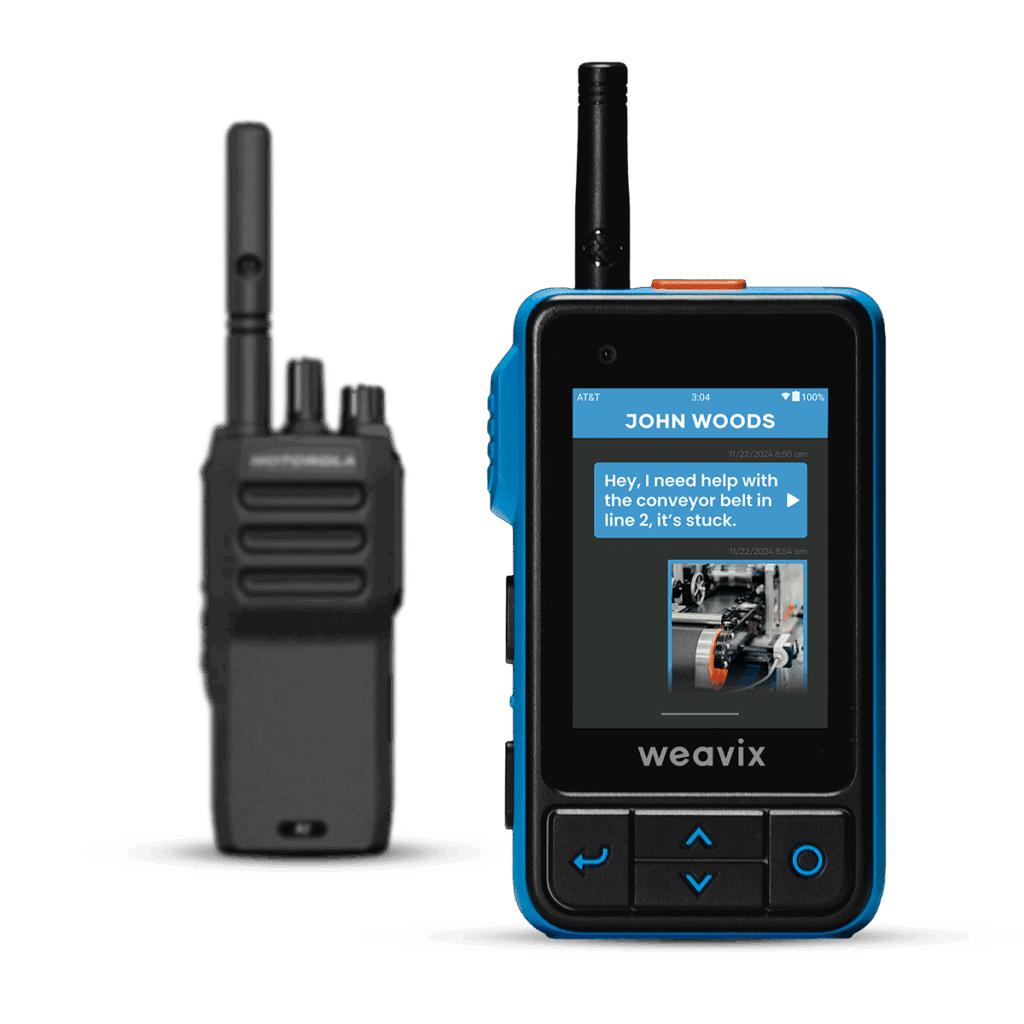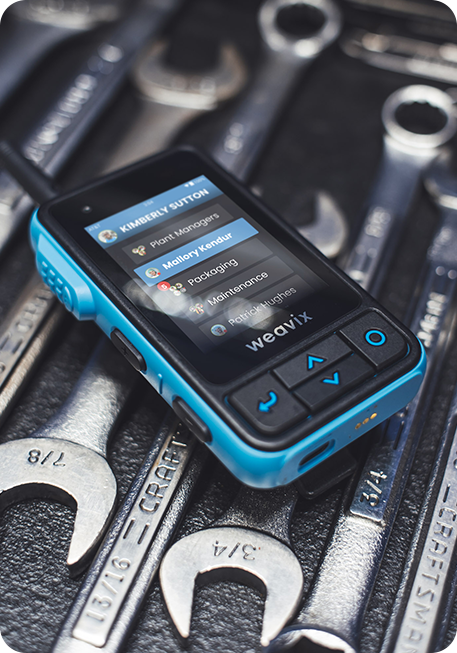Two-Way Radio Comparison: Walt vs Motorola MOTOTRBO
Walt Smart Radio System vs Motorola MOTOTRBO
This Two-Way Radio Comparison between the Weavix Walt Smart Radio System and Motorola MOTOTRBO highlights how smart radios built for the frontline outperform legacy systems in cost, compliance, and performance.
When you factor in licensing, repeaters, maintenance, and lost knowledge, Motorola MOTOTRBO costs significantly more while delivering less.

TL;DR
Motorola MOTOTRBO: $169,040 per year for 120 radios. Conversations disappear once spoken. Requires FCC licenses, repeaters, and manual device management.
Walt Smart Radio System — the Frontline Communication System of Record: $94,088 per year for 120 devices. Every exchange is transcribed, archived, and searchable for compliance and performance.
Savings: $74,952 in the first year alone.
Why: No FCC licenses, no repeaters, lower management overhead, transcription, archiving, and advanced safety features.
Bottom line: Walt Smart Radio System is 10X more cost-efficient and captures frontline knowledge as operational data — something MOTOTRBO can’t deliver.
Why This Comparison Matters
The Walt Smart Radio System is a frontline platform that delivers measurable ROI, accessibility for hearing-impaired workers, compliance-ready logs, and lifecycle protection.
Walt Smart Radio
The Walt Smart Radio System was purpose-built as the Frontline Communication System of Record. It not only reduces costs but also transforms frontline conversations into auditable, searchable data that improves downtime, MTTR, quality, and compliance.
This study compares the one-year total cost of ownership (TCO) for 120 deployed radios.
Motorola MOTOTRBO
Motorola MOTOTRBO is often treated as the “default” enterprise radio system. But when you examine the true total cost of ownership (Download our Free Guide) — licensing, repeaters, maintenance, and lost knowledge — the expense adds up quickly, while the value stops the moment someone lets go of the push-to-talk button.
Key Manufacturing and Operational KPIs
Cost is the biggest difference between MOTOTRBO and Walt Smart Radio System. This table compares one-year TCO along with the hidden drivers like licensing, repeaters, and compliance.
Feature / Cost Driver | Walt Smart Radio System | Motorola MOTOTRBO |
|---|---|---|
1-Year TCO (120 radios) | $94,088 | $169,040 |
Licensing | No FCC license required | Requires FCC license per channel |
Repeaters & Infrastructure | None; LTE/Wi-Fi + FRS backup + SimulCast | Needed; $1k–$5k each |
Device Management | Local updates, no central visibility | Cloud-based console, centralized fleet control |
Transcription & Archive | None | Every call, photo, and video archived & searchable |
Shift Continuity | Manual notes | Automated summaries, searchable records |
Safety Features | Tone-only emergency button | SOS with ID, GPS, logging |
Ruggedness | IP67; not intrinsically safe | IP68, C1D2 intrinsically safe |
Compliance | No logs | |
Feature Comparison
Walt Smart Radio System reduces costs while adding measurable business value. Compared directly to Motorola MOTOTRBO there is a clear ROI problem with MOTORTRBO.
Motorola MOTOTRBO (120 radios): $169,040 per year
Walt Smart Radio System (120 devices): $94,088 per year
That’s a $74,952 savings in year one alone, with additional ROI from reduced downtime, faster repairs, fewer reworks, and shorter onboarding.
MOTOTRBO stops at connecting people in the moment. Walt captures and transforms those conversations into data that drive measurable business outcomes.

Never Buy a Dumb Radio Again.
Equip your workers with the Walt Smart Radio System. Move beyond your perception of what a radio should do. Walt is more than a radio, it’s a frontline communication and safety platform that enables every worker.
>>>> Learn how the Walt Smart Radio System sets the standard for modern industrial communication.
Motorola MOTOTRBO vs Walt Smart Radio System: The Real Story
Licensing, repeaters, device management, and compliance add hidden costs to MOTOTRBO. Here is how those factors compare against Walt Smart Radio System.
Licensing
Walt Smart Radio System: LTE/Wi-Fi based. No licenses required.
MOTOTRBO falls short:
FCC license required per channel. Adds recurring cost and administrative burden.
Repeaters & infrastructure
Walt Smart Radio System: Enterprise-wide scalability, no repeaters. Single platform spans multiple facilities.
MOTOTRBO falls short:
Expansion requires costly repeaters at $1k–$5k each
Device Management
Walt Smart Radio System: Cloud-based, centralized control. Fleet-wide updates and real-time analytics.
MOTOTRBO falls short:
Must be updated and serviced individually.
Knowledge capture & compliance
Walt Smart Radio System: Every exchange is archived and searchable. Enables training reuse, and SOP creation.
MOTOTRBO falls short:
Conversations vanish. Emergency button only sends a tone.

Customer Proof
Customer outcomes show why enterprises that used to rely on MOTOTRBO radios moved to Walt Smart Radio System for lower cost, compliance readiness, and knowledge capture.
CertainTeed: Eliminated annual FCC license fees and repeater costs while gaining searchable transcripts for shift handoffs. With MOTOTRBO: recurring costs piled up, and conversations disappeared without records.
Aspire Bakery: Cut onboarding time by 40 percent using archived transcripts and multimedia guides. With MOTOTRBO: no archives meant new operators had to rely on slower, manual training.
Malcolm Drilling: Improved emergency response with audit-ready compliance logs. With MOTOTRBO: incident reporting depended on memory and handwritten notes, creating liability.
PrimeFlight: Reduced outage recovery during peak airport operations with real-time photo and video troubleshooting. With MOTOTRBO: voice-only radios slowed response, extending downtime.
Shell: Rolled out safely across hazardous sites thanks to C1D2 intrinsic safety. With MOTOTRBO: limited intrinsic safety options raised cost and slowed deployment.
A Trusted Partner in Frontline Enablement
Beyond Cost: Walt Smart Radio System Delivers More Value
Cost savings are only part of the story. Walt Smart Radio System also delivers safety, coverage, continuity, and future-proof functionality.
- Coverage: Nationwide LTE/Wi-Fi with FRS backup, eliminating dead zones.
- Ruggedness & Safety: Intrinsically safe (C1D2), dustproof, waterproof, drop-resistant.
- Shift Continuity: Automatic transcription and summaries accelerate handoffs.
- Multilingual Workforce: Real-time translation + archived transcripts for training and safety.
- Future-Proofing: Multimedia messaging, transcription, analytics, and continuous updates.

Frequently Asked Questions
Do Motorola MOTOTRBO radios require an FCC license?
Yes. Each channel requires licensing. Walt runs on LTE/Wi-Fi with no license required.
Do MOTOTRBO radios need repeaters?
Yes. Expanding coverage requires costly repeaters. Walt scales enterprise-wide without repeaters.
How much can I save with Walt Smart Radio System?
In a 120-radio deployment, Walt saves $74,952 in the first year compared to MOTOTRBO.
Does MOTOTRBO provide archives or transcriptions?
No. Conversations vanish after they’re spoken. Walt archives every call and media file.
Is Walt Smart Radio System rugged enough for industrial work?
Yes. Certified intrinsically safe (C1D2), IP68 rated, and built for frontline conditions.




